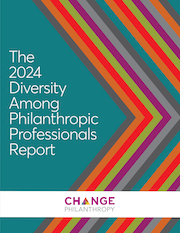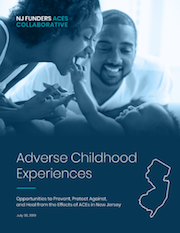Site Search
- resource provided by the Forum Network Knowledgebase.
Search Tip: Search with " " to find exact matches.

This fourth edition of the Diversity Among Philanthropic Professionals Report (DAPP) aims to help the philanthropic community better understand its workforce and leadership utilizing data from surveys submitted by individual respondents based at private, public, community and corporate foundations. The 2024 DAPP’s data and analyses are drawn from 1,934 unique survey responses from staff, independent contractors, and board members working at 98 foundations.

Low levels of diversity in the senior ranks of foundations have proven to be a stubborn challenge for the field of philanthropy. A newly-released report by Forward Change takes an important step toward a deeper understanding of the career pathways of professionals of color in philanthropy—how they enter foundations, how they advance across their careers, and what factors affect their advancement within the sector.
The New Jersey Economic Development Authority (NJEDA) today announced the New Jersey Community Stage Relief Grant Program. The $17.5 million program will provide grants of up to $300,000 to eligible for-profit establishments that host at least two regularly occurring live performances or events per week.
“From Count Basie and Springsteen to Sinatra and Queen Latifah, New Jersey has a long and rich history of supporting performing artists and the venues where they connect with their fans. The COVID-19 pandemic hit performing arts businesses particularly hard, and now that we are able to begin safely reopening it is critical that we help them get back on their feet,” said NJEDA Chief Executive Officer Tim Sullivan. “The New Jersey Community Stage Relief Grant Program, along with the New Jersey Council on the Arts program for nonprofit establishments, will provide much-needed funding to help performing arts venues recover from the impact of COVID-19 and get back to hosting the shows that help make New Jersey such a vibrant, exciting place to live.”
The New Jersey State Council on the Arts held a public meeting on December 13th, during which 22 New Jersey organizations received grants through the Council’s new Creative Aging Initiative grant program. Senior centers, libraries, and arts organizations will provide customized arts experiences for people aged 55 and older, helping to enhance overall wellness, build community, and diminish issues of isolation.
With a focus on lifelong learning in the arts, the Creative Aging Initiative grants will provide $10,000 to a variety of New Jersey nonprofits engaging in creative aging work. Each of this year’s grant recipients will provide two (2) eight-day residencies for New Jersey seniors – at no cost to the participants. This new program was built upon the success of a Creative Aging pilot project the Council concluded earlier this year.
Speaking on the importance of this new grant program, the Council’s Program Officer for Arts Education & Lifelong Learning, Samantha Clarke, said: “Arts education and lifelong learning have been longstanding priorities at the State Arts Council. We look forward to providing new opportunities to reach older adults through the Creative Aging Initiative grant, and we’re especially excited to be working with both arts organizations and community-based organizations in this important work.”
Maryland Philanthropy Network presents a toolkit on Community Centric Fundraising. CCF is a movement aspiring to transform fundraising and philanthropy so that they are co-grounded in racial and economic justice. CCF invites fundraisers and funders to examine the problematic philosophies and practices.
Join us to discuss the CCF principles, what they ask of funders, and how they are impacting the sector. Participants will learn about colleagues implementing some of the principles and will discuss the range of ways funders can be supportive of these principles as a way to demonstrate anti-racist values.
Speakers:
Dani Faulkner, Chief Development Officer, Baltimore Corps and a Community Centric Fundraising Global Council
Dannielle Sturgeon, Director of Development, Baltimore Corps
Cost: Free for CNJG Members and Non Member Grantmakers
Provident Bank recently awarded a total of $50,000 in grants to 11 small businesses and 4 nonprofit organizations as part of the Federal Home Loan Bank of New York (FHLBNY) Small Business Recovery Grant (SBRG) Program.
The SBRG program provides funds to benefit FHLBNY members’ small businesses, including farms and non-profit customers. Through the SBRG Program, members can provide grants of up to $10,000 to qualifying small businesses that have faced economic challenges due to the rate environment, inflation, supply-chain constraints, and/or rising energy costs.
“Provident Bank is proud to partner with the Federal Home Loan Bank of New York to support these worthy organizations through the Small Business Recovery Grant Program,” Mary Brown, senior vice president, chief compliance officer, said. “These grants are essential to the financial well-being of these establishments and their ability to serve their customers,” Brown added.
Join your CNJG CEO colleagues for a monthly peer-to-peer gathering via Zoom focused on you, your role, and your unique and particular challenges as the leader for your organization. If you’re the CEO, Executive Director, Executive Officer – this time and space from 4:00 – 5:00 pm on the third Wednesday of the month - is just for you. This is an opportunity to connect directly with your CEO peers for conversation, community and lightly facilitated topical conversations. The space is yours to share your experiences and challenges, ask questions, and offer ideas on how to support each other and your work. This is also an opportunity to build your relationships with you colleague CEOs in the CNJG network.
Cost: Free for CNJG Members
For more information, please reach out to Theresa Jacks, President and CEO, CNJG.
